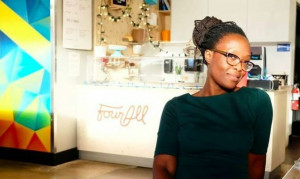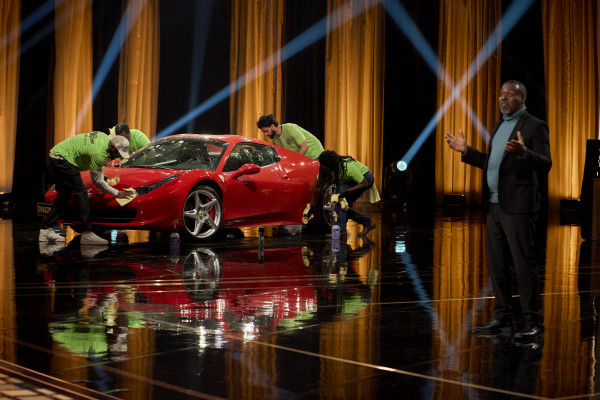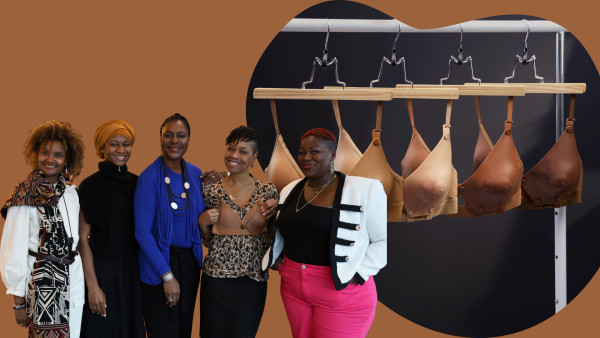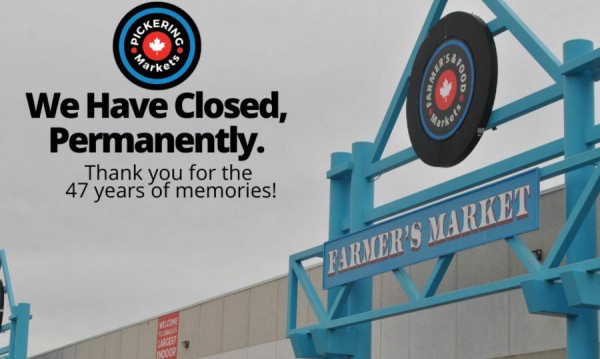I had an opportunity to sit down with Jibola in his home, and pick his brain on everything from the African immigrant experience, to how he has injected his artistic passions into his business, to the value of waiting for good coffee...no matter what Anthony Bourdain had to say about it.
What is Sip and Paint, and what was your reasoning behind launching that?
I had just quit my job and I didn't have any money. I needed to make money like, right now. My girlfriend showed me this magazine article talking about this woman who came up with the idea months earlier. I was like, “I'm not doing that. I'm not going to teach anyone. I've never taught in my life.” I thought it was stupid. I also thought it was kind of like a sell out thing to do. I was not comfortable with that...but I had to do something. My girlfriend is super good with thinking on the spot. She said, “Oh, let's do this and that to get it going.” We got a bunch of friends into a room, rented out space, took some pictures, and put the pictures on a Facebook page. We advertised it. We actually had a lot of fun. All of them painted, and they enjoyed it. They were really proud of their work too. One of them sent me a picture the next day because she put it up in her office. So it was actually kind of rewarding too. It became this thing that I really enjoyed doing. It's been 3 years. I do a lot less of it now though. I have too many interests. Aside from the cafe, my art career, and comics, I actually do design too. I do UX design. I'm working in an agency. So I love all these things; which is good, but there's that constant struggle. Which one do I want to put my energy into today?
Paint parties have, up until recently, been the realm of children’s birthdays and events. Why do you think “paint parties” and the like have suddenly become so popular among an urban adult population?
I think it's a combination of things. When I was doing my own research to start Sip and Paint, I had learned that this woman in New Orleans had started it after Katrina. She lost everything and just started doing this thing to make some money. Last time I checked, she had over 100 locations in the US. She stumbled on to something. 2007 or 2008 the financial crisis happened, and a lot of people lost their jobs. This was something you could do with your friends and family that was inexpensive and you could get a drink. It was almost more of a fun yet economical decision for people. It's good for artists too because there's very little barrier to entry. If you have a computer, you can advertise your business, and if you spend two or three hundred bucks, you can buy some easels here and there...and there you go. You just need space. I think maybe that's what helped make it successful. I think it's also generational. I feel like our generation is a little bit childlike. My parents generation were serious “adults.” As for us, we still want to play video games right? We still want to watch cartoons or whatever because we grew up with that. I think maybe this is just one of those things that also makes us feel like, "Oh we're not that old. We're still cool."
African parents, like many non-North American parents, have been accused of overemphasizing “the honourable 3” in education...doctor, lawyer or engineer. As an artist of Nigerian heritage, did you encounter any resistance to your interest in the arts by any family? If so, how did/do you navigate that?
My dad kind of dug the art but he was also kind of like "I don't want this guy to starve" right? So at first he was like, “Ok study art.” When I went into art full time, and I wasn't able to make it work, he got a little anxious. He said, "Why don't you just go do an MBA?" Then the whole family said, why don't you go do an MBA? This is one of those things I also had to challenge myself on; where my self-worth was tied to my economic value. I thought maybe I should do an MBA, so I can at least get a good job that pays. This was when an MBA was still worth something. I would see my cousins and friends go do it and then make 150k. However, it just didn't sit well with me. I was in this weird limbo where I wasn't doing any art. I wasn't going back to school. I didn't have a job I liked. My dad was like, “just pick something.” I knew for sure I didn't want to do an MBA, but I didn't think studying art was the right move either. That was when I quit my job. My parents were very supportive. My dad printed thousands of my comics and told me to sell them. That was kind of cool. I'm not quite the disgrace of the family in the sense that I'm not a lawyer or a doctor because, I mean, I'm okay. I think the hardest part for me when I chose to be an artist full time was when my dad got sick. My dad passed away last year. When he was going through his cancer treatment, we all needed money to chip in, and I was in a place where I couldn't quite chip in how I would’ve liked.
I’m curious about that transition from leaving a place where the majority is Black (Africa), to coming to a place where that is not the case (Canada) - What was that like for you?
I think for me, it was constantly challenging the things I thought were part of my identity. I'm a “Nigerian Christian from the middle class” …but what do all these things mean? I had to break it down. That's what ended up happening for me, and I was really open to breaking down those walls to see what was on the other side. What does it actually mean for me to be a Black man anywhere in Canada or North America? I think a big one I had struggled with was religion. I grew up in a relatively religious home, and I remember saying something about God to a Japanese girl I knew at the time. I don't remember the context of the conversation, but I do remember her responding like "What's God? I don't understand what you're talking about." Then I understood there were people on the planet who didn't even know what this (God) was...it's just this bullshit. You know what I mean? If I didn't grow up in “this” world, it just wouldn't mean a thing to me right? So there were moments in my life where those kind of things happened and I had to rethink or deconstruct my programming. For instance, I wasn't really that big into Fela Kuti when I was in Nigeria. I didn't actually understand the racial struggle, because I was of the mind that Black people had been in Nigeria this whole time, and Black people have been in North America this whole time...why is there this whole struggle? We Nigerians would come here and ask "Why is it we come here and we're able to get a job and work" ...and blah blah blah. I used to think that. Then when I started working in this country and interacting with different people, I began to understand the history. Taking the time to understand the context, and why things are the way they are, really shaped how I even saw myself. The same struggle that Black people in North America are having, is the same struggle that Black countries are having, because they're still under the thumb of colonialism and corruption. So I may not be dealing with a White person or White supremacy face to face, but in terms of a system, I am dealing with it...I just didn't recognize that I was at the time.
You are the co-owner of Hopper coffee near Kensington market in Toronto, which you launched with your business (and life) partner after leaving the corporate world. How did that come about?
I should add though that the coffee shop (Hopper) was my girlfriend’s idea. It took us two years to find a space. Up until that point, we were just doing Sip and Paint. The whole neighborhood has been really good. Most of our business is from the neighborhood. We almost ended up in Hamilton, because the rents were cheap. Then we got some advice from *Harry Stinson, who told us every business that opened up in the area we wanted to launch Hopper Coffee in had failed. We backed out, but had to lose the deposit we had already made to the guy who owned the Hamilton property in order to do it. Then we found this space in Toronto that used to be an old jewellery store. The rest is history. *(Interviewers note - Harry Stinson is the President of Stinson Properties and a real estate developer of some renown.)
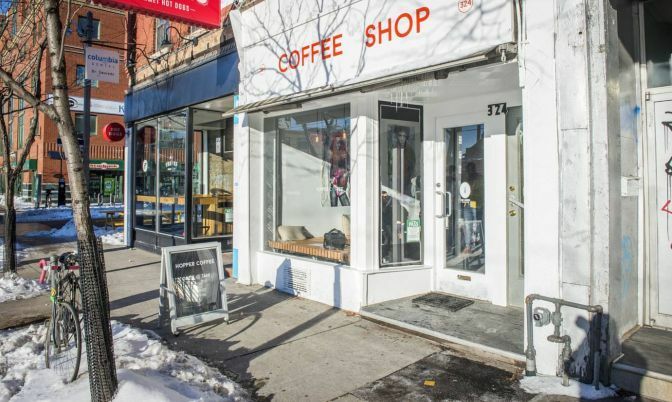
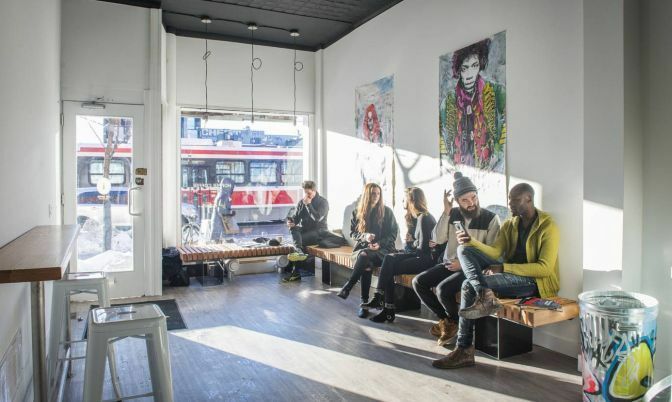
The late Anthony Bourdain had a love hate relationship with high end coffee, often making statements like...
“There are few things I care about less than coffee. I have 2 big cups every morning: light and sweet, preferably in a cardboard cup. Any bodega will do. I don’t want to wait for my coffee. I don’t want some man-bun, Mumford and Son motherf*cker to get it for me. I like good coffee but I don’t want to wait for it, and I don’t want it with the cast of Friends. It’s a beverage; not a lifestyle.”
As the owner of a cafe serving good quality coffee, do you think he had a point?
First, I have to say I loved Anthony Bourdain. That being said, I file that comment under...that's your opinion. He was entitled to his opinion. I think coffee is just one of those things that we just “do” now. Some people like their coffee mad quick. Some people can't wait 30 seconds. They come in, line up, and they’re out. Some people like to just have their espresso in the morning, and are prepared to wait for the good quality coffee. Sometimes there's a time where you want to have coffee to go, and there's a time where you're like “You know? I'm just going to chill and make it pleasurable.”
Life is that way too.
Byron Armstrong is a freelance writer and lifelong Torontonian, raised in Jane-Finch and living downtown.
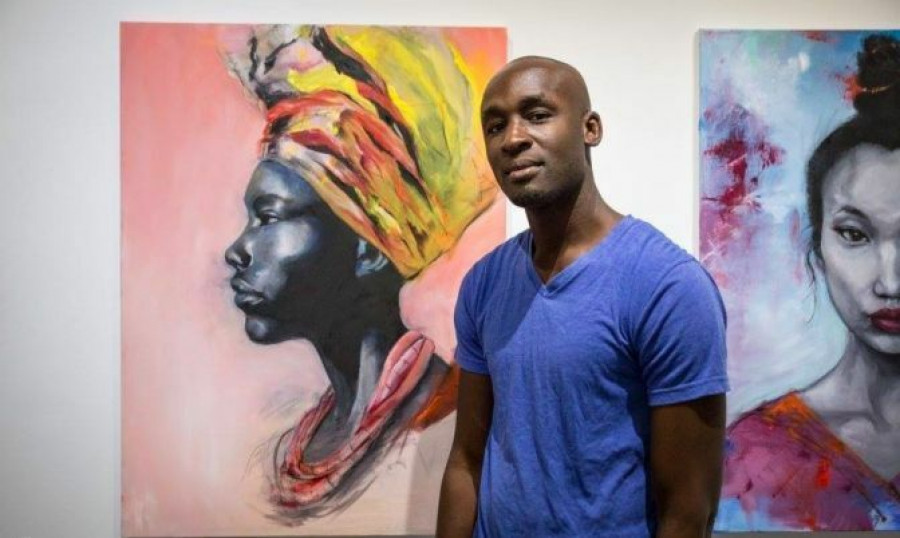
 By
By 





